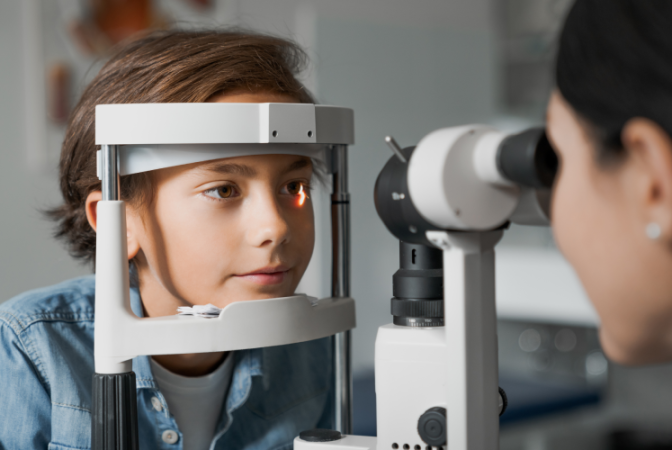50% OFF a Complete Pair of Glasses
*Restrictions apply. Click here for details.
What is Myopia?

Myopia, commonly referred to as nearsightedness, affects nearly 50% of Americans. This prevalent eye condition makes distant objects appear blurry while nearby objects remain clear. Fortunately, myopia can be easily diagnosed through a routine eye exam and effectively managed with prescription lenses or refractive surgery.
Effective and Customized Treatment for Myopia

At Clarkson Eyecare, our specialists leverage cutting-edge laser technology to accurately diagnose myopia (nearsightedness) and create customized treatment plans designed to improve your vision and enhance your quality of life. We're dedicated to helping you effectively manage myopia so you can see clearly and live life to the fullest.
What is Degenerative Myopia?

This rare form of myopia, also known as pathological or progressive myopia, typically develops in those with nearsightedness. Degenerative myopia causes damage to the back of the eye, significantly impacting daily activities and potentially leading to blindness if not diagnosed and treated correctly. While there is no cure for degenerative myopia, the eye care specialists at Clarkson Eyecare can provide effective treatments that can prevent further damage.
Myopia Treatment Options
Nearsightedness is corrected by focusing light directly on your retina with corrective lenses or surgery. Prescription glasses or contact lenses can counteract the increased curve of the cornea or length of the eye to improve distance vision, but for a long-term solution, refractive surgery can be a practical option. Surgical options include:
LASIK
Laser-Assisted In Situ Keratomileusis, or LASIK, is a popular refractive surgery that uses a laser to reshape the cornea, correcting myopia by allowing light to focus more precisely on the retina. The procedure is quick, involves minimal discomfort, and typically provides rapid vision improvement.
PRK
Photorefractive Keratectomy (PRK) also reshapes the cornea with a laser, but unlike LASIK, it removes the cornea’s outer layer, which then regrows naturally. This option is best for patients with thin corneas, requiring a longer recovery time but offering a high success rate in improving myopia.
SMILE
SMILE, or Small Incision Lenticule Extraction, is a less invasive refractive surgery that creates a small, lens-shaped piece of tissue with a laser that is removed through a tiny incision. This procedure has a quick recovery period and is best for patients with myopia, with or without astigmatism, offering minimal risk of dry eye symptoms.
Can Myopia Be Prevented?

Myopia often cannot be entirely prevented, but specific measures can reduce risk. For example, children who spend more time outdoors are often less likely to develop myopia than those who stay indoors, and limiting screen time or extended close-up activities like reading and writing can help you avoid nearsightedness. An eye exam is the best way to determine if you are at risk of nearsightedness. The experts at Clarkson Eyecare can diagnose any refractive errors you may have and provide tailored treatments that meet your unique vision needs.
Frequently Asked Questions About Nearsightedness
Myopia and hyperopia are common refractive errors that affect how your eyes focus light. While both impact the clarity of your vision, myopia and hyperopia affect your vision at different distances. While myopia blurs distant objects, hyperopia makes it difficult for individuals to see nearby objects.
Learn more about the differences between myopia and hyperopia.
While presbyopia is also a refractive error, unlike myopia, it develops naturally as part of the aging process. Presbyopia mainly affects the ability to focus on close-up objects, typically becoming noticeable at age 40 and worsening over time. While myopia risks are avoidable, presbyopia is unavoidable in aging.
Learn more about the differences between presbyopia and myopia.
Myopia can be easily diagnosed through a basic eye examination. Eye exams provide a complete picture of your eye health, allowing your eye doctor to determine the best treatment for your unique case. Your eye doctor may use a visual acuity test, refraction test, and slit-lamp exam to assess your ocular health and determine the correct prescription for your nearsightedness.
Correct Refractive Errors with the Specialists at Clarkson Eyecare
Myopia can make seeing distant objects difficult, interfering with essential daily tasks like driving. Clarkson Eyecare can complete a comprehensive eye exam online or in person, ensuring you have access to critical eye care no matter where you are. Comprehensive eye exams are recommended at least once every two years for adults over 20 to monitor their vision and catch any potential problems early.
Through a basic eye exam, Clarkson Eyecare’s refractive error experts can enhance your distance vision and maintain your overall eye health. If you’re experiencing the symptoms of nearsightedness, schedule an appointment at Clarkson Eyecare to take the first step towards clear vision.
